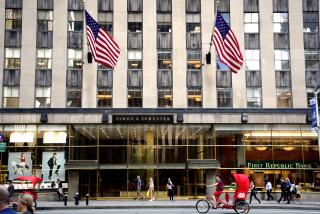Kirch Assets Sale May Keep Media Group Alive
- Share via
BERLIN — He may be ostracized and on the brink of bankruptcy, but German media mogul Leo Kirch is like a wounded bear, weakened but with claws sharp enough to hurt.
The reclusive 75-year-old has made a career of squirming out of tight spots created by his complex financial deals and indifference to debt. Despite predictions only a few weeks ago that his empire may collapse, Kirch is hoping to prove that he is the consummate survivor.
If he fails, it would have a ripple effect. The default of Kirch Group loans could trigger a German financial crisis as seven banks, led by Bayerische Landesbank, could lose billions of dollars.
A collapse also would hurt conservatives’ chances in the September elections, particularly in Bavaria, which owns half of Landesbank.
Kirch has maintained a low profile and is not talking during the negotiations to save his operations. His latest and most precarious crisis was caused by nearly half of his $7 billion in short-term debts and buyback options falling due as the global slump in advertising slashed the income and value of his myriad holdings.
Kirch and his lieutenants, ruling over a kingdom of 150 operations under three divisions of Kirch Group, have signaled in recent days that they will try to sell some prime assets to earn cash for some big bills due in April. He is heavily invested in television, making rival Rupert Murdoch, chairman of News Corp., a potential suitor. On Monday, Kirch Group appointed a three-member panel to advise on reorganizing the media businesses’ $5.7-billion debt.
Among Kirch Group’s stellar holdings on the block are a 40% stake in publishing behemoth Axel Springer Verlag and controlling rights to broadcast Formula One racing, one of the sporting world’s most-watched events.
Media here report that an undisclosed group of German investors is talking about paying $960 million for the shares in Springer, publisher of Germany’s mass-circulation Bild newspaper and several other periodicals that generate $2.6 billion in sales a year. That would just about cover a $400-million loan soon due to Dresdner Bank and a $669-million “put” option activated by Springer that requires Kirch Group to buy back the publisher’s 1999 investment at what is now more than seven times its market value.
But Formula One is an asset Kirch Group will have trouble tapping in the short term. The group borrowed most of the $1.8-billion cost of its 58% stake when Kirch Group acquired it from SLEC Holdings, owner of the television rights to the racing circuit. Kirch won’t get any of the profit from Formula One broadcasting until SLEC pays off a $1.4-billion bond, which could take until 2005. The auto makers that run racing teams have threatened to start their own circuit when their contract with SLEC runs out in 2007.
Even if Kirch Group staves off collapse by divesting its Springer shares and Formula One stake, it faces an even steeper put option that must be exercised by British Sky Broadcasting, a News Corp. subsidiary, for $1.4 million by October.
Negotiations between Kirch and Murdoch broke down two weeks ago on a deal to settle the debt with Kirch Group assets, probably the Kirch Pay-TV company that loses $69.6 million a month and forces Kirch Group to keep slurping from the credit trough to pay for programming rights.
But industry analysts believe Murdoch is interested in parlaying Kirch Group’s obligation--which company officials have acknowledged they cannot pay--into a News Corp. foothold in the German media market, which accounts for 30% of industry revenue in Europe.
Murdoch reportedly was in Germany last week, but he would not discuss the status of talks.
Noting that Kirch Pay-TV is in need of at least a $1.7-billion infusion to upgrade its antiquated technology and uninspiring offerings, Merrill Lynch media analyst Bernard Tubeileh in Frankfurt, Germany, said Murdoch had the kind of deep pockets to make a go of pay TV in Germany.
“Someone like Murdoch could do something with pay TV here. He has the money to invest, and without investment in the infrastructure, it will never take off,” said Tubeileh, noting that German viewers get more than 30 channels free and will be tempted to subscribe to pay TV only if a broader range of services is included.
Kirch Group’s Premiere cable network has managed to attract only about 2.4 million subscribers--far below the 4 million promised to Murdoch and other investors by this time. Kirch Group’s failure to deliver viewers and meet other benchmarks laid out three years ago has enabled Murdoch to employ his buyback option.
As a private company, Kirch Group is under little obligation to open its books to auditors, so even the conglomerate’s biggest creditors are unsure of the extent of its debts and obligations. A cursory investigation into Kirch Group’s solvency by a group of its creditor banks has produced more dire estimates of Kirch Group’s obligations, German newspapers reported last week, quoting unnamed banking sources. The report said debts exceed $11.3 billion, more than the company’s estimated value, although that too is shrouded in secrecy.
Most vulnerable to a total collapse of Kirch Group is its biggest lender, Bayerische Landesbank, which holds $1.65 million in loans outstanding to the group. The state bank is further back in the payment schedule than Dresdner and other creditors, with the next unspecified installment due late this year.
It also has less solid collateral than Deutsche Bank, whose loans are secured by Kirch Group’s Springer stake.
As a native Bavarian and longtime friend of former Chancellor Helmut Kohl and his conservative Christian Democratic Union, Kirch for years found the Bavarian bank--controlled by the conservative political establishment--to be generous beyond all reason.
But now that Bavarian Gov. Edmund Stoiber, head of the state sister party to the Christian Democratic Union, has been chosen as the conservative challenger to Chancellor Gerhard Schroeder in the Sept. 22 federal election, neither the bank nor Stoiber can afford to lend money on such a good-old-boy basis.
A Kirch Group collapse and the thousands of jobs that would be lost with it would seriously undermine Stoiber’s claims to have built a vibrant modern state economy while the rest of Germany is mired in recession. But neither would a Kirch Group debacle and subsequent banking crises at the state and national level do any good for Social Democrat Schroeder, who already is under fire for allowing unemployment to return to the level of 4 million people.
If Kirch can keep his creditors at bay with the Springer sale and negotiate a better Formula One future for the car makers as well as himself, he might survive. Recently, he abandoned plans to merge his broadcasting operations Kirch Media and the profitable ProSiebenSat.1 networks.
“My gut feeling is that Kirch will survive as a very lean Kirch, with Kirch Media, ProSiebenSat.1, the broadcasting libraries,” Merrill Lynch’s Tubeileh said. “These are the core businesses and what he knows how to do best.”
*
(BEGIN TEXT OF INFOBOX)
Major Stakes of the Kirch Empire
Leo Kirch and his lieutenants control an empire that runs about 150 businesses. Among the principal holdings are:
* A 40% share of Axel Springer Verlag, one of Germany’s main publishers and best known for the mass-circulation Bild newspaper
* A 58% stake in SLEC Holdings, which owns the rights to Formula One racing
* An approximate 52% stake in ProSiebenSat.1, Germany’s largest TV broadcaster
* Cable network Premiere, with 2.4 million subscribers
* Kirch Pay-TV, which offers programming for a fee
More to Read
Sign up for Essential California
The most important California stories and recommendations in your inbox every morning.
You may occasionally receive promotional content from the Los Angeles Times.










